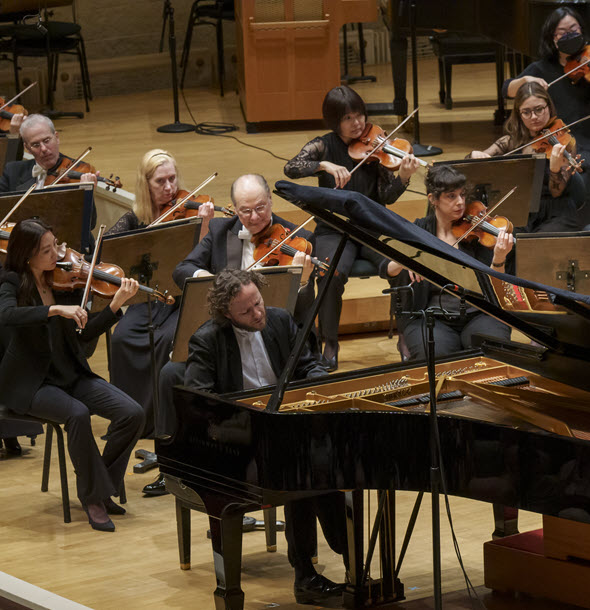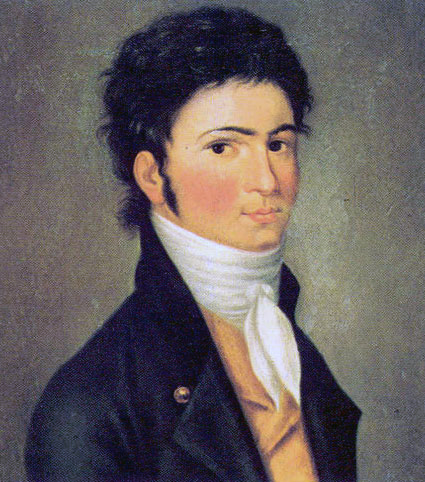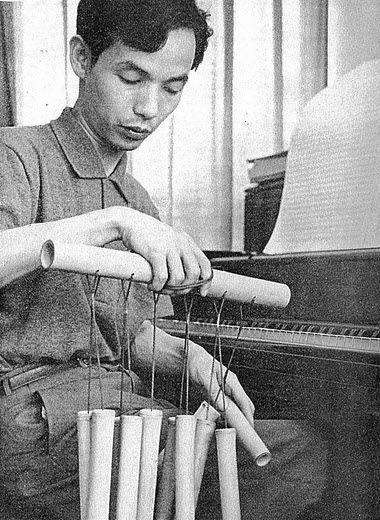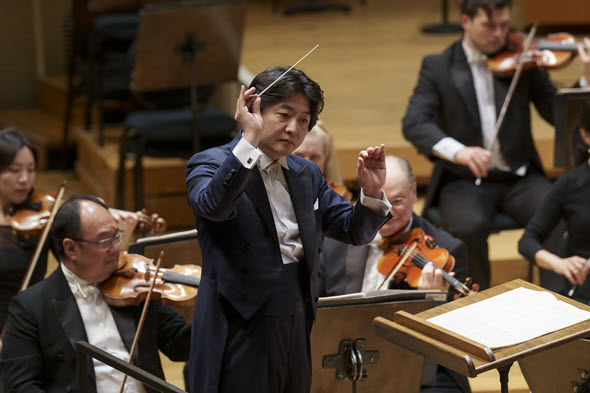Meeting of minds in music of finesse: German pianist, Japanese maestro convene with CSO

Pianist Martin Helmchen brought out the Mozart influence in his delicately nuanced account of Beethoven’s Piano Concerto No. 1. (Photos by Todd Rosenberg)
Review: Chicago Symphony Orchestra conducted by Kazuki Yamada; Martin Helmchen, piano. Repeats May 21 at Orchestra Hall.
By Nancy Malitz
In a performance of rare beauty that set the mind racing in several directions, German pianist Martin Helmchen, Japanese conductor Kazuki Yamada and the Chicago Symphony Orchestra brought patches of human history to life at Orchestra Hall over the weekend of May 16. Too often in concert halls, big sound is understood as the measure of importance, but right away at this CSO event one felt irresistibly drawn by the whispers and the need to lean in.
The first startling wisps were those of Tōru Takemitsu’s “How slow the Wind,” as enigmatic in its reverie as the first words of the Emily Dickinson poem it is named after. We were ushered into a realm of magical quiet, rustled by high string harmonics, bell-like pulses, and an eerie, gently cresting, seven-note motif that doubtless lingers in many listeners’ minds. The impression was that of a vast ocean shore on a starlit and nearly windless night, as if the ocean were breathing, unmindful of the human.
The Japanese composer Takemitsu, who died in 1996, was a child of the Second World War’s devastation. He composed this piece in 1991. If a glance at the score suggests an emphasis on unusual techniques of playing, there is nothing in the spare mystery of these glassy, diaphanous textures, the sudden plucks and distant bells, or the remarkable extremes of pitch that seems out of place.
Little wonder that several generations of Hollywood movie composers have been touched by Takemitsu’s profound influence, especially his ability to nudge traditional instruments toward otherworldly effects. In his elegant CSO debut, the impressive 45-year-old Japanese conductor Yamada and the orchestra with its many virtuosic solo players summoned that boundless inscrutability.
Only on the rare night would such orchestral playing become second in memory to the performance of the guest piano soloist, but for this listener it was one of those occasions: The slender Martin Helmchen, who at 42 nevertheless summons the visual impression of the teenage Mozart at the keyboard, launched into an incredibly beautiful, delicately nuanced performance of Beethoven’s Piano Concerto No. 1 in C major.
The composers’ lives overlapped by several years, and there is such an abundance of Mozartian elegance in the way Helmchen plays this 1795 concerto by the 25-year-old Beethoven that it made me want to believe in the distinct possibility that these two giants actually met in Vienna around 1787 or so. Mozart would have been 31, ailing and near the end of life; Beethoven in his teens.

Beethoven in 1801, about six years after he wrote the Piano Concerto No. 1 (Wiki copy of Karl Traugott Riedel portrait)
There is much of a young man in this Beethoven concerto. It is joyfully immortal, up to the brim in playfulness and wit, even as the writing is profound. Beethoven wrote it for himself to perform and the frisky, perpetually tumbling finale is a delightful lark. I repressed the desire to get up and dance.
The size of the CSO for the Beethoven was right for Orchestra Hall, if big for an ensemble of the composer’s day, with two horns, two trumpets and timpani along with an ample contingent of winds and strings. But it’s the same size to which Mozart recently had gravitated. In fact, there a certain serendipity regarding Helmchen’s former CSO appearances in late Mozart and early Beethoven concertos. Together their performances trace a changing era.
Helmchen first performed with the CSO in 2016, when he was 34, offering what was technically the earliest Beethoven concerto, in the key of B-flat major, although it is called Beethoven’s Concerto No. 2. Last season Helmchen brought in Mozart’s Piano Concerto No 25 in C major, which would have been very much in the air to influence Beethoven when he wrote the Concerto No. 1 in C major that Helmchen and the CSO are performing through May 21. Altogether, if we were to listen to these three works in sequence – Mozart, Beethoven 2 and then Beethoven 1, we would be able to hear a nifty bit of history evolving.
The CSO concert rounded itself off with Franck’s Symphony in D Minor, a beloved crowd favorite, easy to follow and to love, if too often overdone. This was the best performance I can recall hearing. The eloquent solo for English horn seemed as if written for CSO’s Scott Hostetler, and Yamada reminded one of no one so much as CSO music director emeritus Riccardo Muti in the care he took to lend the Franck the elegant, sophisticated treatment it so essentially requires.



